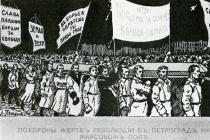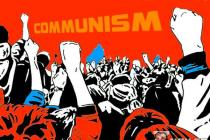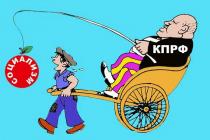Until a few decades ago, the world communist movement was a powerful force to be reckoned with for the world's leading states, including the United States. Even under the conditions of the “crusade against communism,” the communist parties remained the vanguard of the left.
Today the situation has changed dramatically. With the exception of China and a number of Asian countries, as well as Cuba, the influence of the communist parties is almost invisible.
In a number of European countries, not only communist parties are banned, but also communist symbols. In the European Union, statements are increasingly being heard that equate communism with fascism and national socialism, making the communists responsible for fomenting the Second World War.
***
Countries of the former USSR and the Eastern Bloc where communist ideology is prohibited ...
Albania
Lustration. All high-ranking civil servants, members of the ruling Labor Party before 1991, as well as those who collaborated with the secret police were prohibited from being elected or from holding leading positions in state bodies until 2002 (1995 laws).
Prohibition of the Communist Party. Prohibition of fascist, Marxist-Leninist and racist parties (1992 law).
Hungary
Lustration. Criminal liability without a statute of limitations for persons who committed “betrayal of the Motherland” in December 1944 - May 1990, up to life imprisonment (1992 law). In 1994, the Constitutional Court declared this law unconstitutional. The second stage of lustration (until 2001) was reduced to the disclosure of information about the cooperation of citizens with the state security authorities. In 2005, parliament opened wide access to classified documents about intelligence agents.
Prohibition of symbols. Communist and Nazi symbols have been banned since 1993. Individuals who use the symbols of totalitarianism to disturb civil peace or demonstrate them in public are fined.
Georgia
Lustration. A ban on holding high positions in the state for persons who served in the KGB or held leading positions in the Communist Party of the Soviet Union (2010 law). A commission on lustration has been created, which is engaged in the eradication of communist symbols in Georgia, including in the names of streets and squares, as well as the liquidation of monuments praising the totalitarian past. Former employees of the special services of the Soviet Union, as well as former officials of the Communist Party and the Komsomol will not be able to work in the executive authorities and in the judicial system (2011 law).
Prohibition of symbols. Communist and Nazi ideology is prohibited, as well as the use of Soviet and fascist symbols in public places (2011 law).
Latvia
Lustration. All candidates for parliamentary deputies are required to indicate in writing whether or not they have ties with Soviet or other secret services (1992 law). The prohibition of election to persons who were members of the Communist Party and a number of friendly organizations after January 13, 1991, as well as employees and agents of the KGB (1995 law).
Prohibition of symbols. Since 1991, Soviet and Nazi symbols have been banned from public events. The ban does not apply to entertainment, holiday, commemorative and sporting events.
Lithuania
Lustration. A law was passed on the verification of the mandates of deputies suspected of deliberate cooperation with the special services of the USSR or other states.
Prohibition of symbols. The use of Soviet and Nazi symbols, hymns, uniforms and images of leaders of the National Socialists of Germany and leaders of the CPSU at public meetings has been prohibited since 2008.
Prohibition of the Communist Party. Since 1992, the Communist Party has been banned on the territory of the country, in fact it operates underground.
Poland
Lustration. All those wishing to enter the civil service (ministers, judges, deputies, senators) and candidates for parliamentary elections, who had previously collaborated with the communist special services, had to repent publicly and be forgiven. If such information was concealed, the applicant was deprived of the right to hold public office for a 10-year term (1997 law).
Prohibition of symbols. Criminal liability (fines, imprisonment for up to two years) for the storage, distribution or sale of things or records that contain communist symbols, since 2009. Their use for artistic, educational purposes, as well as collecting is allowed. An article of the Criminal Code prohibits Nazi symbols and the display of symbols of “other totalitarian regimes”.
Czech Republic
Lustration. The Communist Party of Czechoslovakia has been called "a criminal organization worthy of condemnation." Cadres and secret agents of the special services, employees of the party apparatus of the Communist Party of Czechoslovakia, who "politically led" the state security, were deprived of the right to hold responsible posts in state bodies for 5 years if a special commission could prove their guilt (1993 law).
Prohibition of symbols. Communist symbols are prohibited. But the Communist Party of Bohemia and Moravia remains one of the leading political forces in the country.
Estonia
Lustration. The Law on Extrajudicial Mass Repressions in Soviet Estonia in the 1940-1950s was adopted, according to which the Prosecutor's Office was instructed to consider the issue of initiating criminal cases and prosecuting persons guilty of mass murder and other crimes against humanity.
Prohibition of symbols. Banning the use of Nazi and Soviet symbols in public places since 2007
Turkmenistan
Prohibition of the Communist Party. The Communist Party of Turkmenistan (CPT) has been operating illegally since 1992. In 2002, after a series of opposition protests, the leader of the CPT, Rakhimov, was accused of participating in the preparation of the assassination attempt on President Niyazov and sentenced to 25 years in prison. According to unconfirmed reports, in December 2006, he was killed in prison along with several of his associates.
Uzbekistan
Prohibition of the Communist Party. The Communist Party of Uzbekistan, founded in 1994, exists on an illegal basis.
Moldavia
The ban on the use of communist symbols for political purposes and the propaganda of totalitarian ideology was in effect on July 12, 2012, but on June 5, 2013, the Constitutional Court overturned this ban as contrary to the Constitution.
Ukraine
Since May 21, 2015, “public denial of the criminal nature of the communist and national socialist (Nazi) totalitarian regimes”, as well as public use and promotion of their symbols, has been prohibited. It is prohibited to produce, distribute and publicly use the symbols of the communist regime (including souvenir), public performance of the anthems of the USSR, the Ukrainian SSR, other union Soviet republics or their fragments. The primary offense is followed by a punishment of restriction or imprisonment for up to 5 years with possible confiscation of property, for a second offense or its commission by an organized group of persons or using the media - imprisonment from 5 to 10 years with possible confiscation of property.
***
- Germany
According to paragraph 86a of the German Penal Code, it is prohibited to distribute or publicly use at a meeting or in correspondence, production, use for commercial purposes within the country or abroad, symbols or materials containing symbols of a party that has been recognized by the Federal Constitutional Court as illegal and contrary to the Constitution, which since 1956 is the Communist Party of Germany.
Such symbols include, in particular, flags, symbols, uniforms, slogans and greetings, while symbols that look outwardly similar enough to be confused with symbols of prohibited organizations are considered equivalent. For such actions, a person can be prosecuted and sentenced to imprisonment for up to three years or a fine.
Indonesia
The Communist Party and public display of its symbols are prohibited.
In which countries of the world is the communist party banned? and got the best answer
Answer from Ping Pong [guru]
It was banned in Germany in 1956. We did it right.
Answer from Pedal horse[guru]
In civilized countries, the party of murderers is prohibited.
Answer from ArArAt *****[guru]
In South Africa, during the apartheid regime ..
Answer from Nikolay Khomyakov[guru]
As far as I know, in Latvia.
Answer from Yergey Ivanov[guru]
The communist parties for 2011 are ruling in China, Cuba, Vietnam, Laos, North Korea (under the name of the Workers' Party of Korea).
They are members of the ruling coalitions in Cyprus, Italy, Nepal, Uruguay.
Cuba Cuba (Communist Party of Cuba) (1959), the only legal party in that country
Democratic People's Republic of Korea (DPRK) (Workers' Party of Korea leads the United Democratic Patriotic Front) (1948)
People's Republic of China (PRC) (Communist Party of China, leads the Patriotic United Front of the Chinese People); Hong Kong and Macau are excluded from this system (1949)
Vietnam Vietnam (The Vietnamese Communist Party leads the Vietnamese Fatherland Front) (1976)
Laos Laos (Lao People's Revolutionary Party leads the Lao Front for National Construction) (1975)
Syria Syria (Syrian Communist Party is part of the National Progressive Front) (1963)
Moldova Moldova (The Party of Communists of the Republic of Moldova has a formal majority in parliament, but is not the ruling one)
Nepal Nepal (From August 2008 to March 2013, representatives of the communist parties (the Communist Party of Nepal (Maoist) and the Communist Party of Nepal (united Marxist-Leninist)) became prime ministers of Nepal (2008)
Uruguay Uruguay (The Communist Party of Uruguay is part of the Broad Front - a coalition uniting communists, socialists, Trotskyists, Christian Democrats, which has been in power in Uruguay since 2004. In the 2004 elections, the Broad Front won 51.7% of the vote and held 52 MP out of 99. José Mujica, a former member of the Tupamaros (National Liberation Movement) partisan movement, a radical Marxist organization that used urban guerrilla methods in its armed struggle against the government, became President of Uruguay on March 1, 2010) (2004)
South Africa South Africa - South African Communist Party
Ukraine Ukraine - Communist Party of Ukraine
Sri Lanka Democratic Socialist Republic of Sri Lanka - Communist Party of Sri Lanka
taken from the site
Answer from Vsevolod shipyards[guru]
in many Muslim countries such as Saudi Arabia, UAE, Bahrain, in Myanmar there are countries where it never existed, all sorts of Fiji, Belize, etc., if it were banned in Russia, it would be just wonderful!
Answer from Walter[guru]
if they were banned, then there is a reason for that. after the communists sucked blood from half the world, it is not surprising that they banned it.
Answer from nikita chernov[newbie]
Communist parties are banned in countries where the ruling regime is a dictatorship, because the communist parties oppose some people to exploit others
I will not describe the history of the bans, but I note that the Ukrainian government will be in good company.
It is quite natural that the fascists fought actively against the communists. In 1926, the Italian Communist Party was banned, and in January 1933 - the Communist Party of Germany. It is interesting, by the way, that Hitler did not consider it possible to ban the Communist Party just like that - with reference to the nature of its ideology and history. The arson of the Reichstag was staged, in which the communists were accused. Moreover, Georgy Dimitrov was later taken to a public trial, he was miserably lost and Dimitrov was released ... However, the KKE was still banned, of the 300 thousand members of the KKE (at the beginning of 1933), about half were persecuted, thrown into prisons and concentration camps , tens of thousands killed.
Various nationalist regimes did not lag behind the fascists.
Take Indonesia, for example.
On the night of October 1, 1965, an attempted coup d'etat took place in Indonesia, which became known as the September 30 Movement. Five high-ranking generals were kidnapped and killed by activists of youth organizations affiliated with the Communist Party. The conspirators, supported by some of the officers of the presidential guard and the Air Force headquarters, announced the transfer of all power to the Revolutionary Council.
Control of the army passed to General Suharto, who had suppressed the uprising by October 2. The military accused the KPI of organizing a coup attempt. Evidence of the communist party's connection with the September 30 Movement was indirect, there were suggestions that the uprising was organized by Suharto to seize power and organize reprisals against the KPI, or the initiative was taken by the Air Force command, competing with the leaders of the ground forces of Suharto and Nasution. Soon, repressions against the communists began throughout the country, about 500 thousand party members (real and alleged) were killed, the party was actually defeated. General Suharto removed President Sukarno from power and became President of the country in 1968.
Note that Suharto also needed a significant reason to ban the Communist Party. Although the case did not come to court.
Oh yes. 1991 year. The new democratic government, which consisted of one person (or almost one person) of communists, banned the CPSU. Perhaps they were ashamed. In the sense - I really wanted to stay in power and did not want anyone to control. And so they did - instead of writing a statement about leaving the party, they banned the party itself and took away its property. And the truth is - what is she?
The Communist Party of Ukraine does not want to simply ban it now either. The well-known radical politician Lyashko offers two reasons for the ban.
First, it turns out that it was the Communist Party of Ukraine who organized the bloody dispersal of the Maidan. True, for some oversight, she did not set fire to the Reichstag Radu. No, I like the idea with Rada more - so what if it didn't burn? There was no dispersal of the Maidan either. And the CPU is certainly not in any way involved in attempts to do at least something, simply because it practically does not influence the government. So far, the biggest success of the communists has been forcing the parliament leadership to put to a vote the question of canceling the pension reform, which the opposition has failed. Tom is poslidovna.
Secondly, it turns out that the Communist Party of Ukraine recently held the 44th Congress, which is reprehensible. Lyashko's party lags far behind and this confuses him.
You know, when I compare the scale of the personalities of Hitler, Suharto and even the "Belovezhskaya troika" with Lyashko, I start to have a cognitive dissonance. Truly - what country, such terrorist attacks ...
What happened to the most traditional communist parties in Europe? Which of them have entered into an alliance with the other leftists, and who are still resisting alone? Here are their main theses, alliances and election results.
Before talking about the communist parties of other countries, it is important to note the following information about the Portuguese Communist Party (PCP): in the entire euro area, it is the party led by Jeronimo Sousa that has the most votes compared to its counterparts in other countries. This state of affairs has persisted for several years, but the parliamentary elections on October 4 reaffirmed it: the PCR managed to gain 8.25% and get 17 seats - the highest figure since 1999.
In Europe, after the PCP, the second Communist party with the most votes is the Greek KKE with 5.6%. The least popular is the British Communist Party, with just over a thousand voters across the UK voted for in the May elections. Neighboring Portugal, in Spain, the Communist Party has been running in coalition with the United Left since 1986 - as in the case of the PCP, which has run with the Greens since 1987 - in the Coalition for Democratic Unity (CDU). Let's take a look at some of the PCP comrades in Europe in order.
Greece. Loses votes but doesn't give up
Apart from the PCP, among those European communist parties that still retain the ideological matrix of Marxism-Leninism, it is the Greek KKE that demonstrates the greatest electoral success. In the last parliamentary elections on September 20, which confirmed the victory of SYRIZA, won by it back in January this year, the KKE was the fifth party in terms of the number of votes gained - 5.6%.
The Greek Communist Party functioned underground until 1974, when the Greek far-right dictatorship came to an end. Since then, this party has existed legally and has never lost its representation in the Greek parliament. Her best result was recorded in June 1989 - 13.1%, when she stood in the elections in a coalition with the left-wing Synapismos - which later became one of the political forces that formed SYRIZA.
The days of coalitions for the KKE seem to have passed after the collapse of the Soviet Union - it was then, after this historic turning point, that the Greek communists lost their votes. Since then, voting results have stabilized at 5-6% - although in May 2012, under the leadership of Aleka Papariga, the first woman to lead the party, peaked at 8.5%. The current General Secretary of the KKE is Dimitris Koutsoumpas. The KKE is in favor of Greece's withdrawal from the euro and the European Union, as well as from NATO.
On the party's website, available in several languages, you can read a passage that well illustrates the KKE's rave rhetoric:
“Without underestimating the consequences of changing the balance of power, we must be more demanding, first of all, of ourselves. We need to be more rigorous in order not only to consolidate and consolidate what we have already achieved, but also to move into a more dynamic phase of counterattack and strengthening of forces. We do not bend or ignore difficulties. We objectively accept our responsibilities, without any embellishment or nihilism. "
KKE has one representative in Brussels, in the group of the "United European Left" - there are also PCP and the Portuguese Left bloc.
France. Together on the Left Front
The French Communist Party (PCF), although continuing its autonomous activities, has recently been participating in elections under the label of the Front de Gauche. The PCF coalition is by far the largest party (in 2011, according to L'Express, it numbered 138,000 activists), however, none other than the leader of the second largest political force, the Left Party (9,000 members), appears at the forefront of the coalition. This is Jean-Luc Mélénchon, a former Trotskyite teacher and minister of vocational education in the government of Lionel Jospin, who in 2008 decided to leave the French Socialist Party to found the Left Party. In the 2012 presidential elections, Melanchon became the fourth, gaining 11.1% of the vote. One of his promises was to impose a 75 percent tax on those whose annual earnings exceed 1 million euros.
Until 1994, the PCF was the owner of the daily newspaper L'Humanité, which since then has been a formally independent publication, while providing access to its pages to all ideologically close parties to the party. As in Portugal, in France, the communists traditionally hold a holiday with concerts, discussions and rallies, the name of which refers to the newspaper. Feast "Humanite" (Fête de L'Humanité).
The left front is represented in the European Parliament by four MPs in the United European Left group.
Spain. Far from Podemos
As in the case of France, the Spanish Communist Party (PCE) has been running for elections since 1986 as part of the Izquierda Unida coalition. While the latter encompasses other political forces - such as the Republican Left or the Open Left - the leaders of the United Left have always been the general secretaries of the PCE, which had 12,558 members in 2009 and is the largest party in the coalition. It is currently headed by Alberto Garzón.
(The case of the PCE is identical in every way to the PCP, which has been in elections since 1987 in a coalition with the Greens to form the CDU. Like the Spanish United Left, the CDU also has the lion's share of parliamentary seats: 15 MPs against two from the party " green ").
A coalition - yes, but not to the extent of uniting with the Podemos from the European political family, to which the Portuguese Left bloc also belongs. After months in which both parties seemed to be moving towards rapprochement ahead of parliamentary elections scheduled for December 20, 2015, Podemos' poor results were causing a chill. The division was confirmed after the meeting of the two sides, each of which in the end spoke of "national unity", despite the lack of unity between themselves. “We are sorry that Podemos closed the door to popular unity,” Garzon said.
“We continue our work towards change and we regret that there are those who choose not to join (...). Our goal is clear: to build national unity, ”Podemos said in a statement.
The United Left has 4 MPs in Brussels, also in the United European Left group.
Great Britain. Help Corbin?
When two parties are confused with one another, it is likely that neither party is particularly powerful. This is the situation in Great Britain with respect to two parties called communist: the Communist Party of Britain and the Communist Party of Great Britain.
In July, the secretary general of the British Communist Party - the larger of the two, whose newspaper (albeit unofficially) is the Morning Star, Robert Griffiths announced his support for Jeremy Corbyn, even before he was elected as Labor leader. “Only Jeremy Corbyn advocates taxing the rich and capitalist monopolies, investing in public services rather than privatizing them, building more social housing, returning energy and railways to the state, denying anti-union laws and weapons of mass destruction - expensive, immoral and useless, ”writes Griffiths.
The confusion began when another Communist Party (PCGB) was accused of infiltrating its activists into the ranks of Labor to vote for Corbyn in the delegate elections. Only now, these accusations also extended to the PCB. Griffiths was quick to clarify that the Communist Party was not his own. “It's a bit silly, a bit like The Life of Brian,” he said, comparing the situation to a film by comedian group Monty Python.
In the parliamentary elections in May 2015, the PCB received only 1,229 votes. PCGB did not participate.
However, the British communists do not exist only in these parties. Within the Labor Party itself there is a Marxist faction, the so-called Labor Party Marxists.
“Our main task is to turn the Party of Labor into an instrument of the working class and international socialism. To this end, we are ready to reunite with others in search of the unity of the left, both inside and outside the party, ”we read in the list of the main provisions of this group.
Germany. Rebirth of the Stasi?
Karl Marx and Friedrich Engels were Germans, but even that does not seem to be enough for the German Communist Party to gain real significance for the country's politics. The party was last represented in the Bundestag in 2008, when Christel Wegner, a member of the German Communist Party but elected from the Left (Die Linke), was expelled from the party faction after she interviewed calls for the return of the political police. times of the GDR:
"I think that if a new society were to be created, we would again need an organization [like the Stasi] to protect the country from reactionary forces trying to destroy the state from the inside."
It is in Die Linke that the main German left forces are concentrated (in general, the name of the party speaks for itself). The party was formed in 2007 and has absorbed various forces to the left of the second largest party in Germany, the Social Democratic Party, including the latter's dissidents. In addition, it included old members of the Party of Democratic Socialism (the successor to the Socialist Unity Party of Germany, the political force on which the GDR dictatorship relied).
In the last parliamentary elections in Germany in 2013, Die Linke received 8.2% of the vote. The party has seven deputies in the Brussels European Parliament and became a source of inspiration for the Portuguese Left Bloc when it decided in 2012 to opt for two co-chairs - a two-headed leadership model.
The choice of ideology has divided people forever. For young people, for the most part, this is just a matter of belonging to one or another subculture, but for people, actions are significant differences that do not allow them to make contact. In this article we will tell you in which countries communism is now, in which video it exists.
Pluralism of opinions
The feudal system had one significant advantage:
- Most of the population was deprived of basic rights;
- The average peasant thought much more about dinner than politics;
- The current state of affairs was taken for granted;
- There was no particular disagreement.
A beggarly existence in harsh conditions is a dubious prospect. But if you remember the number of people killed in civil wars around the world, this will no longer seem such a drawback of a bygone era. A hundred years ago, similar "political debates" took place on our territory, when the following were used as arguments:
- Artillery;
- Cavalry;
- Fleet;
- Gallows;
- Firing squads.
And both sides did not disdain with massive "reductions in the number" of the enemy, so it would not even work to blame any particular ideology. The very dispute, the very belief in the possibility of establishing a better system can turn a person into the most cruel creature.

The theoretical structure of the state
In fact, communism remained only on the pages of theoretical works on political life and state structure. No country in the world has ever had communism, although they tried to build it:
- Ensure social equity;
- Introduce public ownership of the means of production;
- Get rid of the monetary system;
- Leave class divisions in the past;
- Create perfect productive forces.
To put it very roughly, communism implies that the existing production capacity is enough to provide everything that every person on the planet needs, without exception. Everyone can get:
- Necessary medicines;
- Good nutrition;
- Modern technology;
- Necessary clothing;
- Movable and immovable property.
It turns out that it is only necessary to "correctly" distribute all the available goods so as not to "offend" anyone. Everyone will receive exactly as much as he needs. But for this, it is necessary to "get hold of" every production on the planet, taking it away from the current owners. And already at this moment one may encounter insurmountable difficulties. What to say about equal and fair distribution, which the history of mankind does not know and, most likely, will never know.

Countries of victorious communism
There are countries that are trying or have tried to build communism on their territory:
- USSR (disintegrated in 1991);
- China;
- Cuba;
- North Korea;
- Vietnam;
- Kampuchea (disbanded in 1979)
- Laos.
In many ways, the Union exerted its influence, exporting ideology and management mechanisms. For this, he received his share of influence on events within the country. the most successful country with the ruling communist party is China... But even this Asian country:
- Have moved away from the ideas of "classical communism";
- Allows for the possibility of private property;
- Liberalized in recent years;
- They strive to attract as many foreign investors as possible through openness and transparency of the business.
It is difficult to talk about total state control under such conditions. Things are a little different in Cuba and North Korea. These countries do not abandon the path laid in the second half of the last century, although movement along this road causes serious difficulties:
- Sanctions;
- Militarism;
- Invasion threats;
- Difficult economic situation.
These modes, without significant changes, can exist for a very long time - there is enough safety margin. Another question is whether it will benefit the people living in these territories.

European socialists
To countries with a powerful social program can be attributed:
- Denmark;
- Sweden;
- Norway;
- Switzerland.
All that our grandparents dreamed of, the Swedes were able to bring to life. It goes:
- High social standards;
- On state protection;
- About decent wages;
- About a healthy microclimate.
In 2017, a referendum was held in Switzerland on the guaranteed payment to citizens of a certain monthly amount. These funds would have been enough for a comfortable existence, but the Swiss refused. And all without the communist parties, Lenin and red stars.
It turns out that there may be a highly developed state that cares about the well-being of its own citizens and considers this value as its highest priority. Requirements for such a country:
- High labor productivity;
- Lack of habits for world domination;
- Long tradition;
- Strong and independent institutions of power and civil rights.
Any attempts to prove their uniqueness or to impose opinions on other countries lead to a decrease in the role of civil society in public life, which results in strong states with weak social programs.

Where is “good living” now?
There is no real communism in the world. Maybe something similar existed among our ancestors, during the primitive communal system. In our time, communist regimes rule:
- In China;
- In the DPRK;
- In Cuba.
A number of European countries are respectful of social policy, although a bust of Lenin is not in every office:
- Switzerland;
- Norway;
- Denmark;
- Sweden.
Somewhere high living standards are provided by oil revenues, somewhere - long-term and successful investments. But one thing is invariable - for "equality and brotherhood" high labor productivity and good economic performance are required.
The construction of such a model is possible in any country of the world, for this it is not necessary to overthrow the current government and impose the power of the proletariat. It is enough to push the idea of \u200b\u200bhigh social standards and make the task of improving the lives of citizens the main goal of the country.

Videos about strange forms of communism
In this video, political scientist Vyacheslav Volkov will talk about 4 unusual types of communism that existed earlier and exist in our time:














